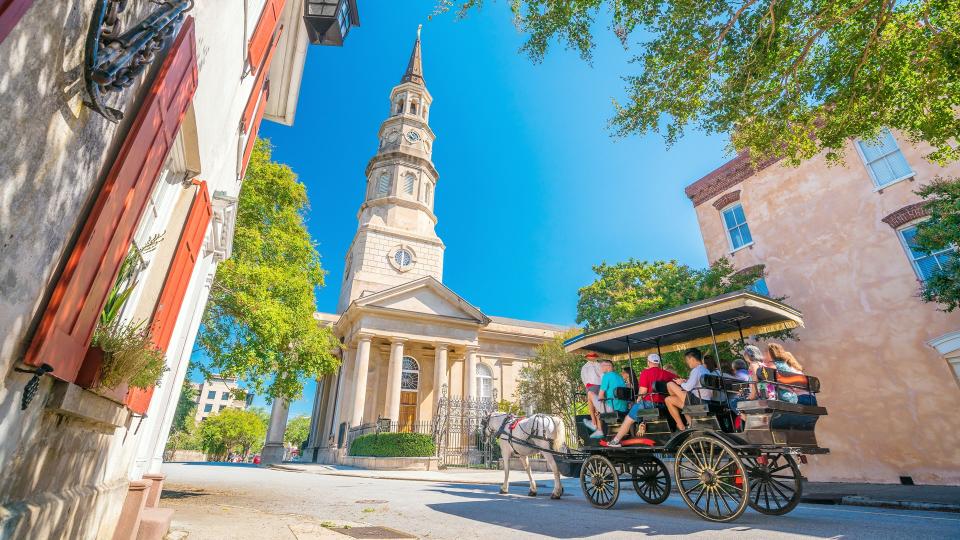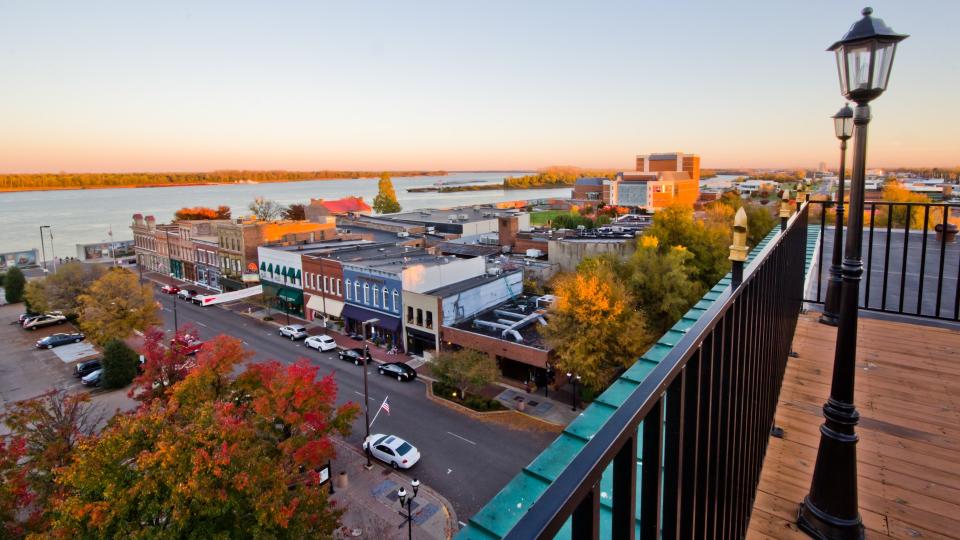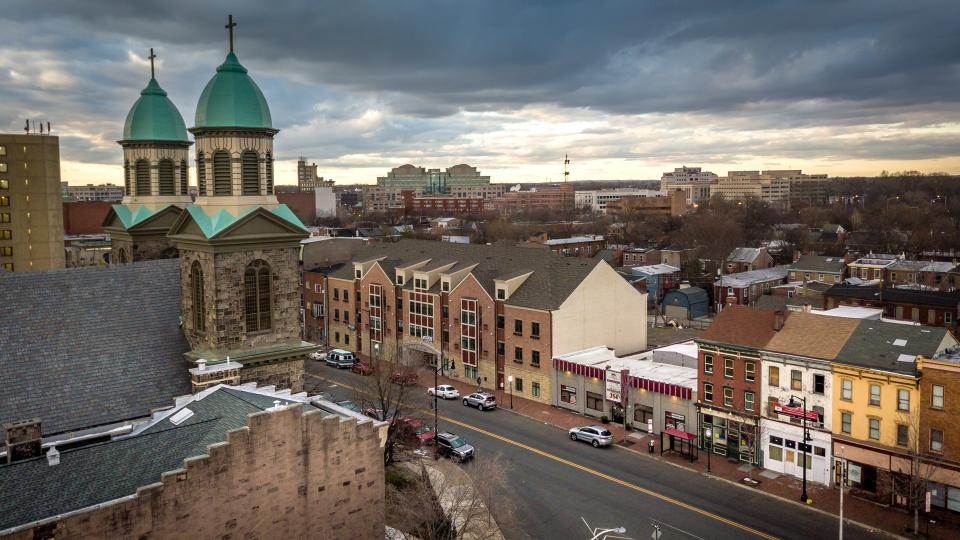People in These 16 States Are Having the Most Trouble Paying Bills

The COVID-19 pandemic caused unemployment rates to reach unprecedented levels in modern America. Consequently, millions of Americans have lost their jobs or been forced to take a pay cut, which has made it hard for many to make ends meet.
Support Small: Don't Miss Out on Nominating Your Favorite Small Business To Be Featured on GOBankingRates -- Ends May 31
Nearly one-third (31%) of people with household incomes between $25,000 to $124,999 are earning less as a result of the pandemic, according to a survey conducted by the Rand Corporation. Of this group, 27% are having trouble paying the bills.
Some states — and their residents — are faring better financially than others. Many of the states struggling the most were in serious debt prior to 2020, and the pandemic has only made things worse.
The "Financial State of the States 2020" report compiled by Truth in Accounting ranks states by their fiscal condition. Based on fiscal year 2019 comprehensive annual financial reports, here’s a look at the states that fared the worst, with more information from the U.S. Census Bureau. See which states' residents are struggling with finances.
Last updated: May 21, 2021

16. South Carolina
Going into the COVID-19 pandemic, South Carolina was $20.8 billion in debt. If this burden falls on taxpayers, it will mean $13,400 in future taxes — without receiving any related services or benefits. This is especially concerning because many South Carolina residents are experiencing financial difficulty during the pandemic.
Right now, 747,889 people are finding it somewhat difficult to pay usual household expenses. Additionally, 110,148 people are behind on their mortgage payments and 110,266 people are behind on rent.
See: Americans' Savings Drop to Lowest Point in Years

15. Rhode Island
As a result of the COVID-19 crisis, Rhode Island is expected to lose $1 billion in revenue. As if that isn’t bad enough, the state was $5.8 billion in debt before the pandemic — a burden of $14,700 per taxpayer.
Since March 13, at least 17,626 Rhode Island residents have lost their jobs, and another 18,776 believe they will lose their job in the next four weeks, at the time of the survey. Given these numbers, it’s unfortunately not surprising that 143,282 people are finding it somewhat difficult to pay their usual household expenses.
Learn: 23 Tips To Build Your Emergency Fund

14. Maryland
COVID-19 has put many Maryland residents in a dire financial situation. Right now 266,962 homeowners are currently behind on their mortgage payments and another 110,266 people are behind on rent payments.
As for the state itself, Maryland was $33.8 billion in debt before the pandemic — serving as a $15,200 burden per taxpayer.
Read More: The Salary You Need To Afford the Average Home in Your State

13. Pennsylvania
An overwhelming 158,976 Pennsylvania residents have lost their jobs since March 13 — around when COVID-19 started shutting things down in the U.S. Another 123,935 expect to lose their jobs in the next four weeks. Likely a ripple effect, 234,489 homeowners in the state are behind on their mortgage payments and 110,266 are not currently caught up on rent payments.
Even before the pandemic began, Pennsylvania was $73.8 billion in debt, which could ultimately cost taxpayers an added $16,400 each.

12. Michigan
Before the pandemic, Michigan was already $56.6 billion in debt — creating a possible $17,000 burden per taxpayer.
COVID-19 has put a serious economic strain on millions of Michigan residents. More than 1.3 million report it being somewhat difficult to pay usual household expenses and another 766,976 are finding it very difficult.

11. Louisiana
Going into 2020, Louisiana was $21.6 billion in debt — a possible $17,000 burden per taxpayer — and the pandemic will likely make things even worse.
As for Louisiana residents, 57,598 people have lost their jobs since March 13. Unfortunately, close to the same amount — 53,876 people — expect to lose their jobs in the next four weeks.
This and other factors have caused many residents to struggle to pay the bills. Sadly, 575,439 people are currently having a very difficult time paying usual household expenses.

10. New York
The pandemic has made it hard for millions of New Yorkers to pay the bills. More than 2.6 million people are finding it somewhat difficult to pay usual household expenses and another 1.8 million are having a challenging time doing so. Sadly, thousands of households are experiencing food insufficiency, with 98,035 reporting they often don’t have enough to eat.
Going into the COVID-19 crisis, the New York budget was at a $118.2 million deficit. If handed down to residents, this could result in a possible $17,200 burden per taxpayer.
Read More: Cities That Spend the Most -- and Least -- on Groceries

9. Vermont
Before the COVID-19 pandemic began, Vermont was $4.5 billion in debt — a $18,900 burden per taxpayer — and this will likely get worse.
Unfortunately, 11,869 Vermont residents have lost their jobs since March 13. Another 8,964 expect to be unemployed within the next four weeks, at the time of the survey. Given these numbers, it’s sadly not surprising that 73,361 people are having a somewhat difficult time paying usual household expenses. Thousands of households are also experiencing food insufficiency, with 2,267 reporting they often don’t have enough to eat.

8. California
Prior to the pandemic, California was $275 billion in debt — a $21,100 burden per taxpayer — and this deficit will likely grow due to COVID-19.
The pandemic has also been tough economically on millions of California residents. More than 4.3 million report having a very difficult time paying for usual household expenses, due to the COVID-19 crisis. Sadly, thousands of households are currently experiencing food insufficiency, with 65,878 households reporting they often don’t have enough to eat.

7. Kentucky
Unfortunately, 11,869 Kentucky residents have lost their jobs since March 13. Another 8,964 also expect to be out of work within the next four weeks. This is likely affecting some residents’ ability to pay their living expenses, including housing. In total, 8,810 people are currently behind on their mortgage payments and 137,255 are past due on rent payments.
Statewide, Kentucky was $32.7 billion in debt before the COVID-19 crisis, which could place a $24,700 burden on every taxpayer in the state.

6. Delaware
Before the COVID-19 crisis, the Delaware budget was at an $8.6 billion deficit — creating a possible $24,900 financial burden per taxpayer. This number will likely increase amid the pandemic.
COVID-19 has also caused economic hardship for thousands of Delaware residents. For example, 136,914 people are finding it somewhat difficult to pay usual household expenses right now, while another 83,269 are having a very difficult time. This is likely exacerbated by the fact that 15,975 people have lost their jobs since mid-March.
Read More: The Average Student Loan Debt in Every State

5. Massachusetts
In Massachusetts, 76,391 residents have lost their jobs since March 13. Even worse — another 73,508 people believe they will also be unemployed in the next four weeks. Given these numbers, it’s unfortunately not surprising that 576,050 people are finding it very difficult to pay usual household expenses during the pandemic. Sadly, 27,733 households also report often not having enough to eat right now.
Massachusetts was $80.9 billion in debt before the pandemic, which equates to a possible $30,000 burden per taxpayer.

4. Hawaii
Economic hardship during the pandemic has made it very difficult for 175,326 Hawaii residents to pay their usual household expenses. This isn’t surprising, considering 20,907 people have lost their jobs since March 13, and another 21,280 expect to be unemployed within the next four weeks, at of the time of the survey. Unfortunately, 11,686 households also report sometimes not having enough to eat.
Hawaii was $16.1 billion in debt before the COVID-19 crisis, which could cause each of the state’s taxpayers to shoulder a $31,700 financial burden.

3. Connecticut
Going into 2020, the Connecticut budget was at a $67.4 billion deficit — a $50,700 burden per taxpayer — and rising.
Sadly, the COVID-19 crisis has also been financially challenging for many residents. For example, 327,353 people admit they’re currently having a very difficult time paying usual household expenses.
As for housing, 113,409 Connecticut homeowners are behind on their mortgages and 69,666 households are not caught up on rent payments. Thousands of households are also struggling with food insufficiency, with 17,709 reporting they often do not have enough to eat.

2. Illinois
Amid the COVID-19 pandemic, 332,278 Illinois homeowners are currently past due on mortgage payments. Another 301,828 households are behind on rent payments.
This is almost definitely due in part to the fact that 136,631 residents have lost their jobs since March 13 — with an additional 149,987 expecting to become unemployed within four weeks. Given these numbers, it’s not surprising that more than 1.2 million people are having trouble paying the usual household expenses right now.
Illinois was $226 billion in debt before the pandemic, which could result in a $52,000 financial burden per taxpayer.

1. New Jersey
Coming in last with the worse financial situation in the U.S., New Jersey was $189.6 billion in debt before the pandemic. This could result in an overwhelming $57,900 financial burden per taxpayer.
The COVID-19 crisis has hit New Jersey residents hard. Millions are currently having trouble paying usual household expenses, with more than 1 million finding it very difficult to do so. As for housing, 346,052 homeowners are behind on mortgage payments and 280,258 are not caught up on their rent.
More From GOBankingRates
This article originally appeared on GOBankingRates.com: People in These 16 States Are Having the Most Trouble Paying Bills
